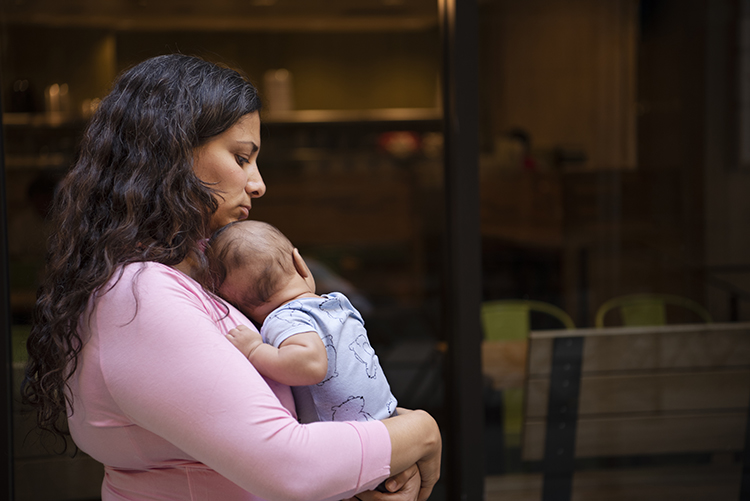In keeping with SAMHIN’s mission of greater dialogue on mental health in South Asians and highlight the important work of others in this area, we invited Neha Pundeer, a New York City psychotherapist and mother, to share her thoughts on postpartum depression.
Many women aspire to relish the journey of motherhood, yet sometimes, this cherished dream transforms into a distressing reality. As a mental health professional who struggled for eight years to conceive, when I finally became pregnant, it seemed as if all my prayers had been answered. However, I encountered the adverse side of this idealized phase, commonly referred to as pregnancy. The debilitating physical symptoms of the first trimester—fatigue, extreme nausea, vomiting – coupled with the lingering fear of losing the pregnancy due to previous conception struggles rendered me practically non-functional. Seeking better physical and emotional support, I returned to my family in India from the US. My health improved during the remainder of the pregnancy, but I experienced a relapse within the first week after delivery. This time, the symptoms struck harder, encompassing constant crying spells, extreme frustration, difficulty sleeping, hopelessness, loss of appetite, and more.
As a professional, it took me nearly two months to realize the gravity of my symptoms and the urgency of prioritizing my mental health. Why did it take so long? It’s largely due to the ignorance and normalization of these symptoms within our culture, where the prevailing belief is that ‘apne aap theek ho jaega’, meaning ‘things will get better on their own.’ To an extent, this holds; milder versions of these symptoms are termed ‘baby blues,’ prevalent in approximately 70-80% of new mothers (American College of OB-GYN, 2018), and typically dissipate within a week or two after delivery. What sets ‘baby blues’ apart from postpartum depression (PPD) is the severity and duration of the symptoms. While baby blues may last a maximum of two weeks, PPD can persist for months to years.
What is PPD? It is a medical condition that affects many women after they have a baby. It’s like perinatal depression, but the only difference is that perinatal depression begins during pregnancy and lasts after pregnancy, whereas postpartum depression only begins after the baby is born. Symptoms of PPD may include:
- Depressed mood throughout most of the day
- Loss of interest or pleasure
- Insomnia or hypersomnia
- Difficulty caring for the baby
- Isolation
- Feelings of worthlessness or guilt
- Fatigue or loss of energy
- Suicidal thoughts or attempts, along with recurrent thoughts of death
- Co-occurring anxiety symptoms
- Changes in weight or appetite
- Difficulty bonding with the baby or experiencing thoughts of self-harm or harming the baby
CDC research (2020) shows that PPD affects up to 1 in 8 new mothers (about 15%). Limited data exists on postpartum experiences for the South Asian diaspora in the US. Many South Asian immigrant women lack the necessary support during and after pregnancy, either due to the absence of familial support or the lack of awareness about the subject, making it challenging for them to access timely help.
Who is at risk of developing PPD? Those dealing with financial difficulties, domestic violence, past psychiatric illness, marital conflict, lack of husband’s support, and the birth of a female baby. Others with a lack of family support, recent stressful events, family psychiatric history, and infant health issues also tend to be impacted significantly.
Fortunately, several treatment modalities can help manage PPD. Cognitive Behavioral Therapy (CBT), Interpersonal Therapy, and support groups have proven beneficial. Medications, such as antidepressants or estrogen patches, are also employed, though caution is advised regarding their use while breastfeeding as not all medications are considered safe for infants. Lifestyle changes, including prioritizing self-care activities like exercise, meditation, yoga, or relaxation techniques, can profoundly impact a new mother’s mental health.
Remember, seeking help is not a sign of weakness but a courageous step toward reclaiming your well-being. As a professional who’s traversed this difficult path, I urge every struggling mother to take that first step toward seeking support and prioritizing mental health. Together, we can navigate through this challenging phase and embrace the joys of motherhood with strength and resilience.
Postpartum depression (2019): Healthy moms and strong babies.
Mughal, S., Azhar, A., Siddiqui, W (2022). Postpartum Depression.
Feature image by Freepik
 By Neha Pundeer, MHC
By Neha Pundeer, MHC
Psychotherapist, New York City, NY
SAMHIN Volunteer
We welcome you to share your experiences and comments.
Subscribe to SAMHIN’s email list if you would like to be notified when SAMHIN publishes new blog posts.



Leave A Comment